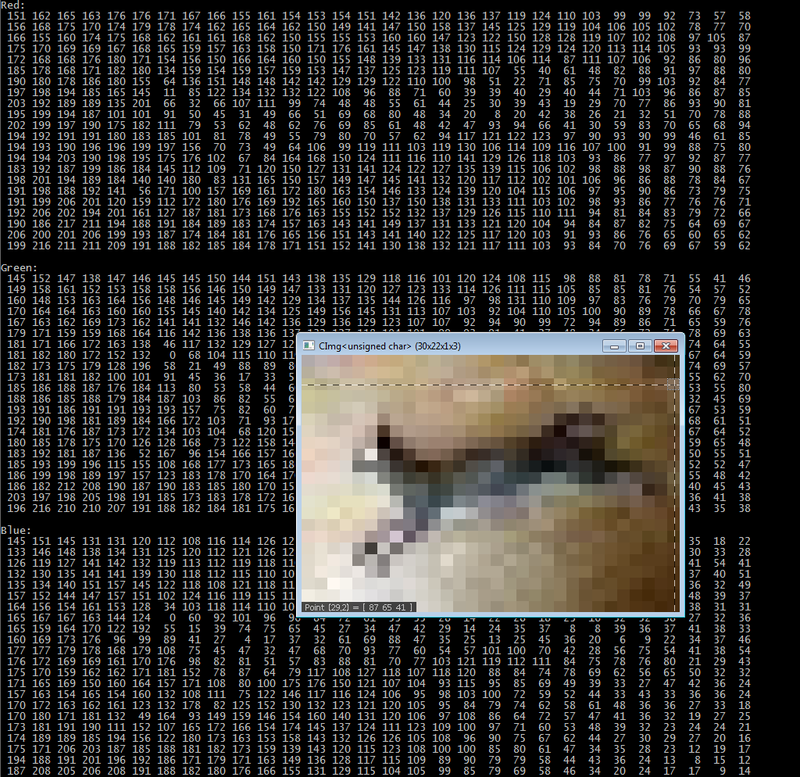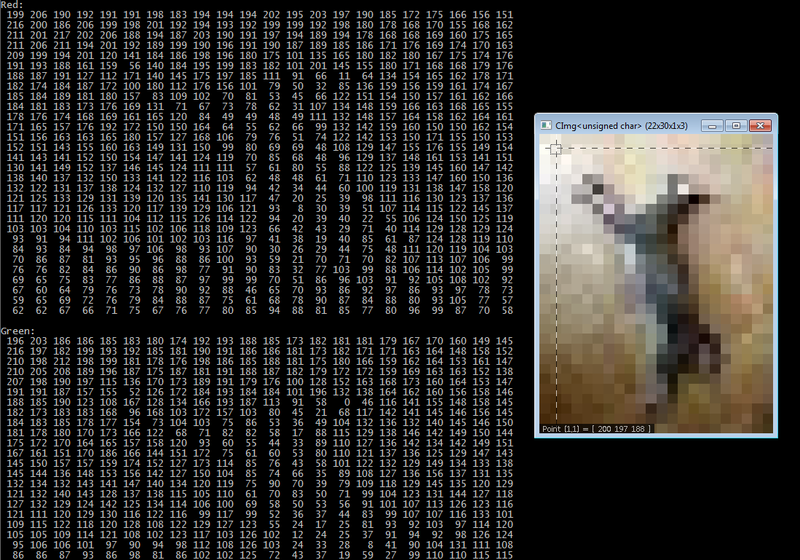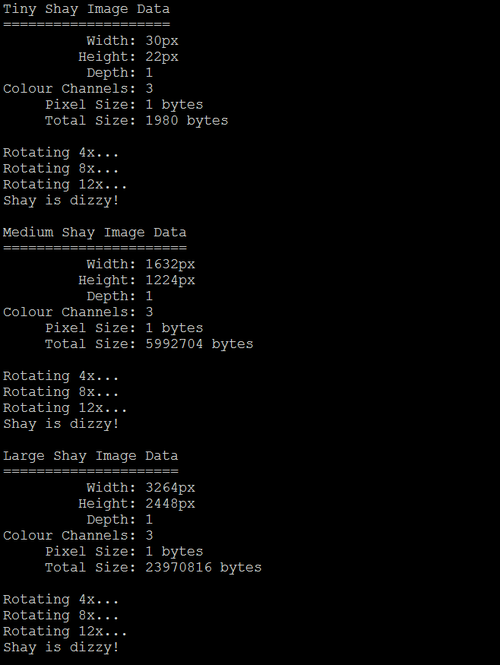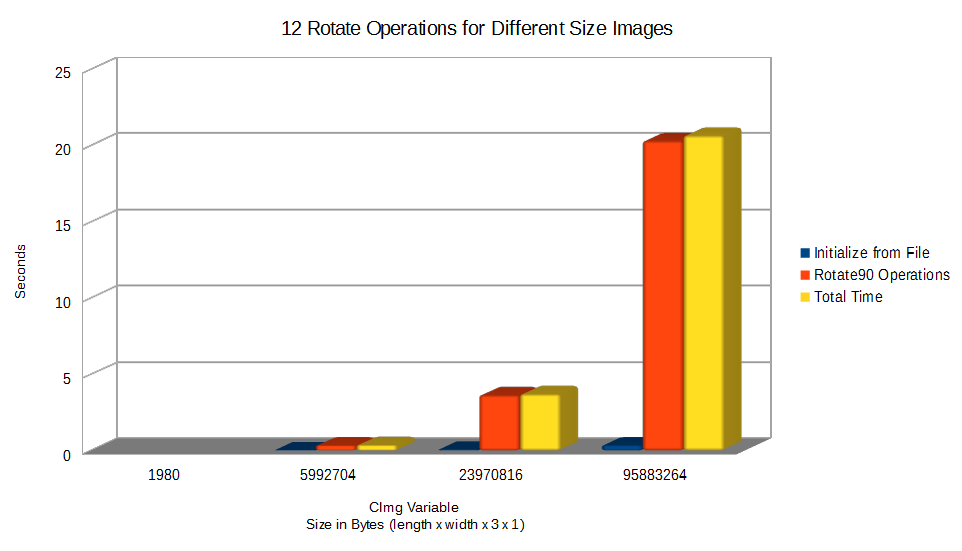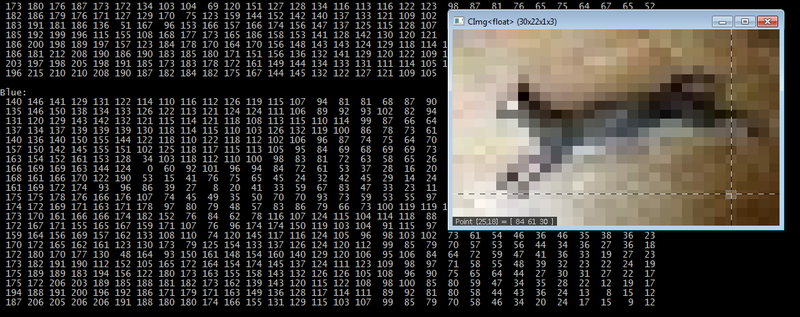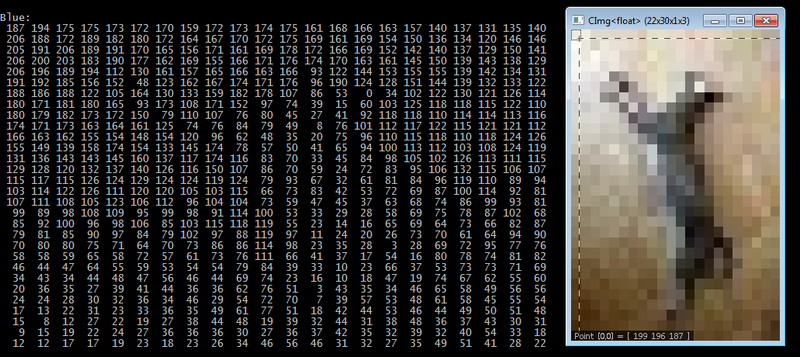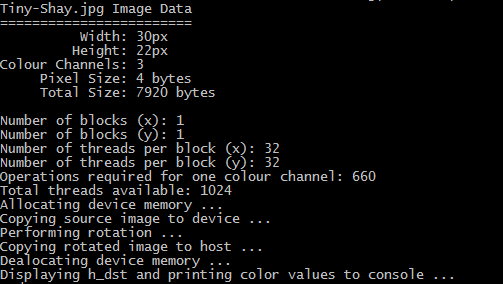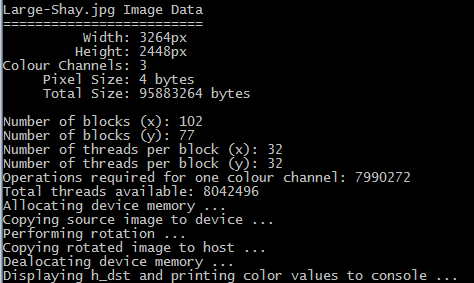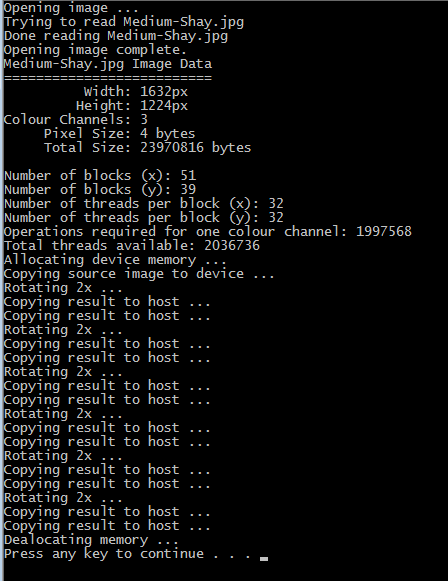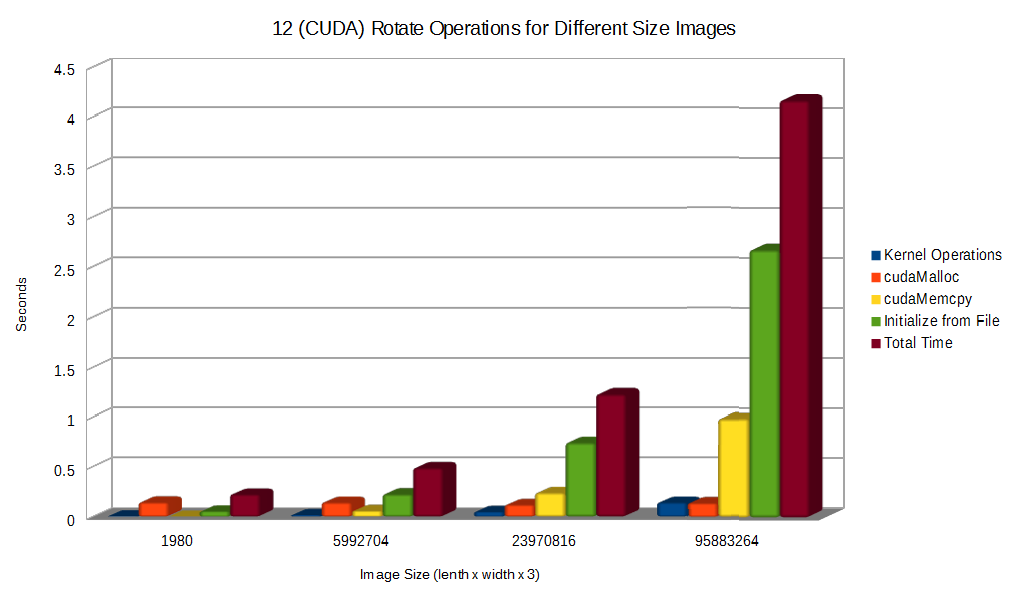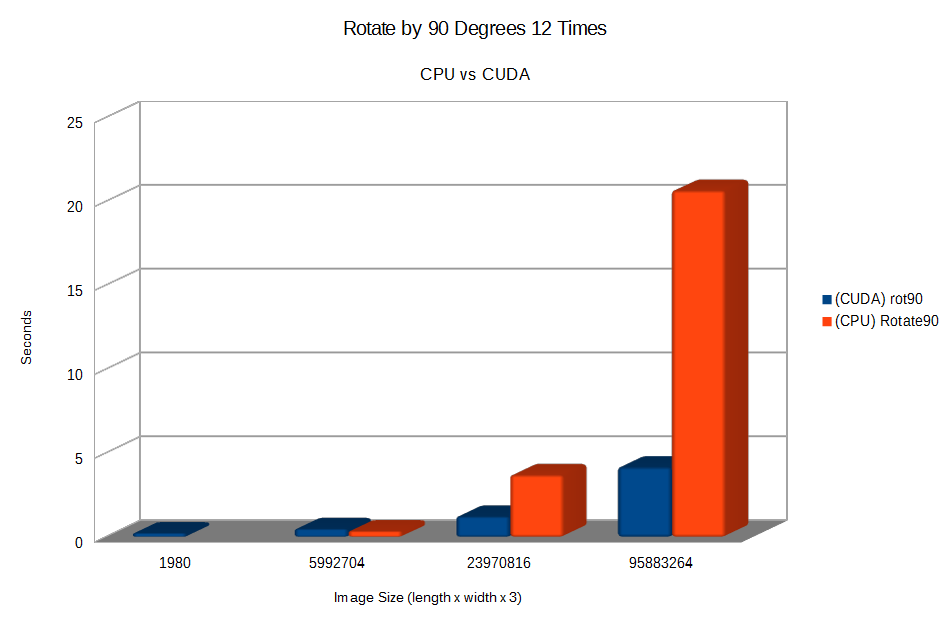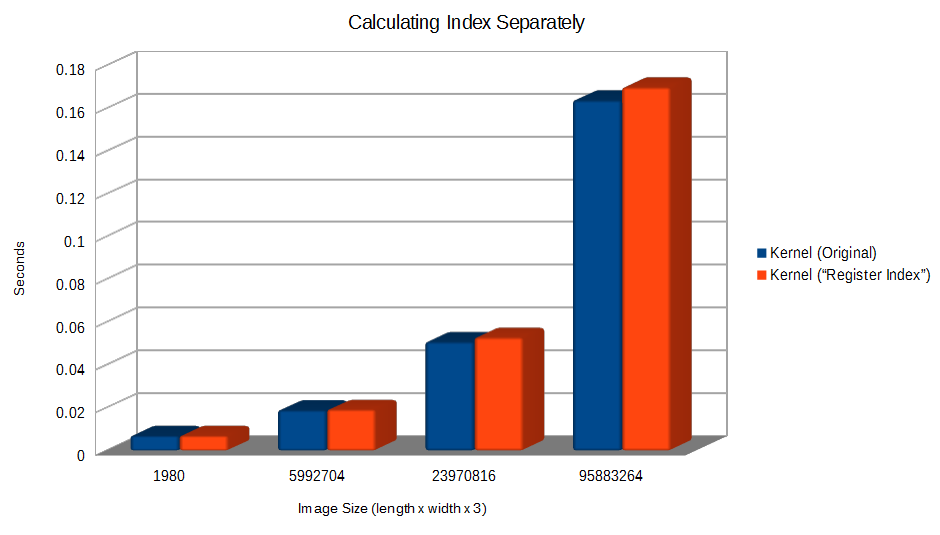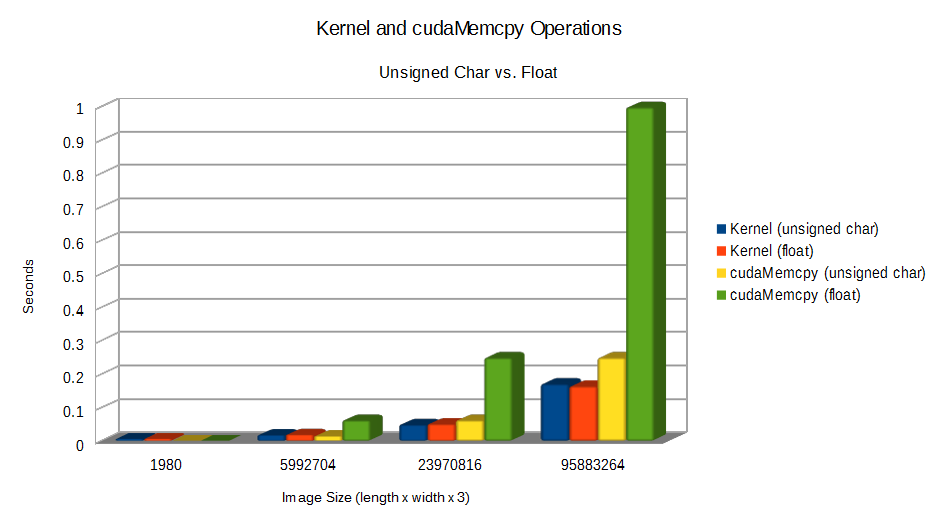Difference between revisions of "Savy Cat"
(→Profiling With Nsight) |
(→Assignment 3) |
||
| (5 intermediate revisions by the same user not shown) | |||
| Line 473: | Line 473: | ||
for (int j = 0; j < height; j++) { | for (int j = 0; j < height; j++) { | ||
for (int k = 0; k < width; k++) { | for (int k = 0; k < width; k++) { | ||
| − | std::cout << std::setw(4) << img[idx(k, j, w, h, i)]; | + | std::cout << std::setw(4) << (int)img[idx(k, j, w, h, i)]; |
} | } | ||
std::cout << std::endl; | std::cout << std::endl; | ||
| Line 490: | Line 490: | ||
} | } | ||
| − | + | PX_TYPE* getImage(char* filename, int &w, int &h) { | |
std::cout << "Trying to read " << filename << std::endl; | std::cout << "Trying to read " << filename << std::endl; | ||
| Line 498: | Line 498: | ||
h = cimg.height(); | h = cimg.height(); | ||
int size = w * h * cimg.spectrum(); | int size = w * h * cimg.spectrum(); | ||
| − | + | PX_TYPE* img = new PX_TYPE[size]; | |
for (int i = 0; i < size; i++) { | for (int i = 0; i < size; i++) { | ||
img[i] = cimg[i]; | img[i] = cimg[i]; | ||
| Line 518: | Line 518: | ||
| − | __global__ void rot90( | + | __global__ void rot90(PX_TYPE* src, PX_TYPE* dst, int src_w, int src_h, int z) { |
int k = blockIdx.x * blockDim.x + threadIdx.x; | int k = blockIdx.x * blockDim.x + threadIdx.x; | ||
| Line 591: | Line 591: | ||
// Allocate device memory for src and dst | // Allocate device memory for src and dst | ||
std::cout << "Allocating device memory ..." << std::endl; | std::cout << "Allocating device memory ..." << std::endl; | ||
| − | cudaMalloc((void**)&d_src, w * h * sizeof( | + | cudaMalloc((void**)&d_src, w * h * sizeof(PX_TYPE) * 3); |
| − | cudaMalloc((void**)&d_dst, w * h * sizeof( | + | cudaMalloc((void**)&d_dst, w * h * sizeof(PX_TYPE) * 3); |
// Copy h_src to d_src | // Copy h_src to d_src | ||
std::cout << "Copying source image to device ..." << std::endl; | std::cout << "Copying source image to device ..." << std::endl; | ||
| − | cudaMemcpy(d_src, h_src, w * h * sizeof( | + | cudaMemcpy(d_src, h_src, w * h * sizeof(PX_TYPE) * 3, cudaMemcpyHostToDevice); |
// Launch grid 3 times (one grid per colour channel) | // Launch grid 3 times (one grid per colour channel) | ||
| Line 609: | Line 609: | ||
// Copy d_dst to h_dst | // Copy d_dst to h_dst | ||
std::cout << "Copying rotated image to host ..." << std::endl; | std::cout << "Copying rotated image to host ..." << std::endl; | ||
| − | cudaMemcpy(h_dst, d_dst, w * h * sizeof( | + | cudaMemcpy(h_dst, d_dst, w * h * sizeof(PX_TYPE) * 3, cudaMemcpyDeviceToHost); |
// Dealocate memory | // Dealocate memory | ||
| Line 662: | Line 662: | ||
// Allocate device memory for src and dst | // Allocate device memory for src and dst | ||
std::cout << "Allocating device memory ..." << std::endl; | std::cout << "Allocating device memory ..." << std::endl; | ||
| − | cudaMalloc((void**)&d_src, w * h * sizeof( | + | cudaMalloc((void**)&d_src, w * h * sizeof(PX_TYPE) * 3); |
| − | cudaMalloc((void**)&d_dst, w * h * sizeof( | + | cudaMalloc((void**)&d_dst, w * h * sizeof(PX_TYPE) * 3); |
// Copy h_src to d_src | // Copy h_src to d_src | ||
std::cout << "Copying source image to device ..." << std::endl; | std::cout << "Copying source image to device ..." << std::endl; | ||
| − | cudaMemcpy(d_src, h_src, w * h * sizeof( | + | cudaMemcpy(d_src, h_src, w * h * sizeof(PX_TYPE) * 3, cudaMemcpyHostToDevice); |
// Rotate image 6 x 2 times, copying result back to host each time | // Rotate image 6 x 2 times, copying result back to host each time | ||
| Line 682: | Line 682: | ||
// Copy d_dst to h_dst | // Copy d_dst to h_dst | ||
std::cout << "Copying result to host ..." << std::endl; | std::cout << "Copying result to host ..." << std::endl; | ||
| − | cudaMemcpy(h_dst, d_dst, w * h * sizeof( | + | cudaMemcpy(h_dst, d_dst, w * h * sizeof(PX_TYPE) * 3, cudaMemcpyDeviceToHost); |
// Rotate again | // Rotate again | ||
| Line 693: | Line 693: | ||
// Copy d_src to h_src | // Copy d_src to h_src | ||
| − | cudaMemcpy(h_src, d_src, w * h * sizeof( | + | cudaMemcpy(h_src, d_src, w * h * sizeof(PX_TYPE) * 3, cudaMemcpyDeviceToHost); |
std::cout << "Copying result to host ..." << std::endl; | std::cout << "Copying result to host ..." << std::endl; | ||
} | } | ||
| Line 720: | Line 720: | ||
;Timeline Results | ;Timeline Results | ||
| − | For each run, I list the 4 operations that took the most amount of time. For a tiny image, allocating | + | For each run, I list the 4 operations that took the most amount of time. For a tiny image, allocating source and destination variables on the device took the longest amount of time, but still, it took well under half a second. It took the same amount of time for every case however. Initializing the CImg variable from the .jpg file quickly became the biggest issue. This operation is CPU bound, and is dependent on the logic of ImageMagick. Copying the rotated image back to the host (cudaMemcpy) starts to become a hot spot as well between the large and huge sized image is a noticeable increase. |
[[File:Summary-2.png]] | [[File:Summary-2.png]] | ||
| Line 732: | Line 732: | ||
=== Assignment 3 === | === Assignment 3 === | ||
| + | ==== "Register" Index ==== | ||
| + | For my first attempt at optimization, I thought maybe, just maybe, the index calculations were being performed from within global memory: | ||
| + | |||
| + | <nowiki> | ||
| + | __global__ void rot90(PX_TYPE* src, PX_TYPE* dst, int src_w, int src_h, int z) { | ||
| + | |||
| + | int k = blockIdx.x * blockDim.x + threadIdx.x; | ||
| + | int j = blockIdx.y * blockDim.y + threadIdx.y; | ||
| + | if (k < src_w && j < src_h) | ||
| + | dst[(src_h - 1 - j) + k * src_h + src_w * src_h * z] = src[threadIdx.x + threadIdx.y * src_w + src_w * src_h * z]; | ||
| + | |||
| + | }</nowiki> | ||
| + | |||
| + | So I declared two register variables and determined the indexes prior: | ||
| + | |||
| + | <nowiki> | ||
| + | __global__ void rot90(PX_TYPE* src, PX_TYPE* dst, int src_w, int src_h, int z) { | ||
| + | |||
| + | int k = blockIdx.x * blockDim.x + threadIdx.x; | ||
| + | int j = blockIdx.y * blockDim.y + threadIdx.y; | ||
| + | int d = (src_h - 1 - j) + k * src_h + src_w * src_h * z; | ||
| + | int s = threadIdx.x + threadIdx.y * src_w + src_w * src_h * z; | ||
| + | if (k < src_w && j < src_h) | ||
| + | dst[d] = src[s]; | ||
| + | |||
| + | }</nowiki> | ||
| + | |||
| + | This only had a slightly negative effect. Although, such a small difference may have been due to the luck of the run: | ||
| + | |||
| + | [[File:Summary-4.png]] | ||
| + | |||
| + | ==== Unsigned Char vs. Float ==== | ||
| + | The first real improvement came from changing PX_TYPE from float back to unsigned char, as used in the serial version. Unsigned char is good enough for all .jpg colour values (255). GPUs are designed to perform operations on floating point numbers, however, we are not performing any calculations outside of the indexing. The performance of the kernel was the same for float or unsigned char. We copy the source image to device once, and back to the host 12 times, making size relevant. | ||
| + | |||
| + | {| class="wikitable" | ||
| + | |+Size Comparison | ||
| + | |- | ||
| + | | | ||
| + | |Unsigned Char | ||
| + | |Float | ||
| + | |- | ||
| + | |Tiny_Shay.jpg | ||
| + | |1.93 KB | ||
| + | |7.73 KB | ||
| + | |- | ||
| + | |Medium_Shay.jpg | ||
| + | |5.71 MB | ||
| + | |22.8 MB | ||
| + | |- | ||
| + | |Large_Shay.jpg | ||
| + | |22.8 MB | ||
| + | |91.4 MB | ||
| + | |- | ||
| + | |Huge_Shay.jpg | ||
| + | |91.4 MB | ||
| + | |365 MB | ||
| + | |} | ||
| + | |||
| + | This saves almost one second worth of latency for the largest file, bringing cudaMemcpy down to about the same time as the kernel execution: | ||
| + | |||
| + | [[File:Summary-5.png]] | ||
| + | |||
| + | ==== Shared Memory ==== | ||
| + | I could not think of how to utilize shared memory for this application. No calculations are being performed. Copying to shared memory would be an additional operation, as one write to global memory is required either way. By copying a small chunk of the source image to shared memory to improve read time, the indexing logic would no longer work. | ||
| + | |||
| + | ==== Constant Memory ==== | ||
| + | Utilizing constant memory for the source image was something I wanted to try. The largest unsigned char file of 91.4 MB seemed affordable, and we do not write to it. | ||
| + | |||
| + | Since it's required to use a constant value when declaring the size of the host variable, I needed to define the size of the largest file and use that for all files: | ||
| + | |||
| + | <nowiki>#define SRC_MAX_SIZE 95883264 | ||
| + | |||
| + | __constant__ PX_TYPE d_src[SRC_MAX_SIZE];</nowiki> | ||
| + | |||
| + | Copy the actual number of elements over: | ||
| + | |||
| + | <nowiki>// Copy h_src to d_src | ||
| + | std::cout << "Copying source image to device ..." << std::endl; | ||
| + | cudaMemcpyToSymbol(d_src, h_src, w * h * sizeof(PX_TYPE) * 3);</nowiki> | ||
| + | |||
| + | Compiling gave an error saying 91MB is too much memory to use: | ||
| + | |||
| + | <nowiki>CUDACOMPILE : ptxas error : File uses too much global constant data (0x5b71000 bytes, 0x10000 max)</nowiki> | ||
| + | |||
| + | The only example file that fit and compiled was Tiny_Shay.jpg, which there is no point in improving. | ||
Latest revision as of 21:14, 10 April 2018
GPU610/DPS915 | Student List | Group and Project Index | Student Resources | Glossary
Contents
Rotate90
Team Members
Progress
Assignment 1
I kept things very simple and created a function that rotates an image 90° clockwise.
Then, I profile and evaluate performance of rotating a tiny, medium, and large sized image file 12 times each.
Dependencies
Two open-source utilities are required in order to run the project code:
- CImg
- Download and extract the CImg Library (Standard Package). This provides the template class used to store image information. The library contains many useful image manipulation functions and methods, including rotate, but we will only be making use of the CImg class and the Display function. Make sure your project include path can find CImg.h, which should be located in the root of the extracted files.
- libjpeg
- libjpeg provides the functionality of reading .jpg file data into a CImg object. It's not quite as strait forward as getting CImg, as you need to compile libjpeg from source. I used the most recent (Jan 2018) version named jpegsr9c.zip from this listing.
- If you have trouble building the solution, this article on Stackoverflow helped me compile it for Windows 7. I used nmake from the Visual Studio command prompt, which uses the tool win32.mak, which can be acquired from the Windows developer toolkit v7.0.
- Once libjpeg has been built, it should result in creation of "libjpeg.lib". Be sure to link this file with compilation of the project code.
Initial Code
- Rotate.h
// Evan Marinzel - DPS915 Project
// Rotate.h
#pragma once
#define cimg_use_jpeg
#define PX_TYPE unsigned char
#include <CImg.h>
#include <iostream>
#include <iomanip>
// Indexing function for CImg object.
// CImg[x][y][z]
inline int idx(int x, int y, int w, int h, int z) {
return x + y * w + w * h * z;
}
// Indexing function for accessing pixel location rotated 90 degrees relative to current location
// CImg[h - 1 - y][x][z]
inline int idx90(int x, int y, int w, int h, int z) {
return (h - 1 - y) + x * h + w * h * z;
}
// Prints colour channel values of img to console.
// Opens image, mouse-over pixels to verify indexing is correct.
// Uses 40 x 40 pixel sample from the top left corner if img is larger than 40 x 40
void display(const cimg_library::CImg<PX_TYPE> img) {
int height = img.height() > 40 ? 40 : img.height();
int width = img.width() > 40 ? 40 : img.width();
for (int i = 0; i < img.spectrum(); i++) {
if (i == 0)
std::cout << "Red:" << std::endl;
else if (i == 1)
std::cout << "Green:" << std::endl;
else if (i == 2)
std::cout << "Blue:" << std::endl;
for (int j = 0; j < height; j++) {
for (int k = 0; k < width; k++) {
std::cout << std::setw(4) << (int)img[idx(k, j, img.width(), img.height(), i)];
}
std::cout << std::endl;
}
std::cout << std::endl;
}
cimg_library::CImg<PX_TYPE> imgCropped(img);
imgCropped.crop(0, 0, width - 1, height - 1, 0);
imgCropped.display();
}
// Print image dimensions and size to console.
void imgStats(const char* title, cimg_library::CImg<PX_TYPE> img) {
std::cout << title << " Image Data" << std::endl;
std::cout << std::setfill('=') << std::setw(strlen(title) + 11) << "=" << std::setfill(' ') << std::endl;
std::cout << std::setw(17) << std::right << "Width: " << img.width() << "px" << std::endl;
std::cout << std::setw(17) << std::right << "Height: " << img.height() << "px" << std::endl;
std::cout << std::setw(17) << std::right << "Depth: " << img.depth() << std::endl;
std::cout << std::setw(17) << std::right << "Colour Channels: " << img.spectrum() << std::endl;
std::cout << std::setw(17) << std::right << "Pixel Size: " << sizeof(PX_TYPE) << " bytes" << std::endl;
std::cout << std::setw(17) << std::right << "Total Size: " << img.size() << " bytes" << std::endl;
std::cout << std::endl;
}
// Rotate src image 90 degrees clockwise.
// Works by assigning pixel values from src to dst.
// - dst must be allocated as valid size
void rotate90(cimg_library::CImg<PX_TYPE> src, cimg_library::CImg<PX_TYPE> &dst) {
for (int i = 0; i < src.spectrum(); i++) {
for (int j = 0; j < src.height(); j++) {
for (int k = 0; k < src.width(); k++)
dst[idx90(k, j, src.width(), src.height(), i)] = src[idx(k, j, src.width(), src.height(), i)];
}
}
}
// Rotate image 360 degrees by calling rotate90 4 times.
void rotate90x4(cimg_library::CImg<PX_TYPE> src, cimg_library::CImg<PX_TYPE> dst) {
rotate90(src, dst);
rotate90(dst, src);
rotate90(src, dst);
rotate90(dst, src);
}
- Rotate.cpp
// Evan Marinzel - DPS915 Project
// Rotate.cpp
#include "Rotate.h"
int main(int argc, char** argv) {
// Allocate memory for 3 CImg structures, initializing colour values from speficied files.
cimg_library::CImg<PX_TYPE> img_tiny("C:\\School\\DPS915\\Project\\CImg-Rotate\\Debug\\Tiny-Shay.jpg");
cimg_library::CImg<PX_TYPE> img_med("C:\\School\\DPS915\\Project\\CImg-Rotate\\Debug\\Medium-Shay.jpg");
cimg_library::CImg<PX_TYPE> img_large("C:\\School\\DPS915\\Project\\CImg-Rotate\\Debug\\Large-Shay.jpg");
// Allocate memory for rotated versions of above, initializing colour values to 0.
cimg_library::CImg<PX_TYPE> img_tiny90(img_tiny.height(), img_tiny.width(), 1, 3, 0);
cimg_library::CImg<PX_TYPE> img_med90(img_med.height(), img_med.width(), 1, 3, 0);
cimg_library::CImg<PX_TYPE> img_large90(img_large.height(), img_large.width(), 1, 3, 0);
// Un-comment to print pixel values to console and display image for 4 rotations
/*
display(img_tiny);
rotate90(img_tiny, img_tiny90);
display(img_tiny90);
rotate90(img_tiny90, img_tiny);
display(img_tiny);
rotate90(img_tiny, img_tiny90);
display(img_tiny90);
rotate90(img_tiny90, img_tiny);
display(img_tiny);
*/
// Display image statistics and rotate 12 times each.
imgStats("Tiny Shay", img_tiny);
std::cout << "Rotating 4x..." << std::endl;
rotate90x4(img_tiny, img_tiny90);
std::cout << "Rotating 8x..." << std::endl;
rotate90x4(img_tiny, img_tiny90);
std::cout << "Rotating 12x..." << std::endl;
rotate90x4(img_tiny, img_tiny90);
std::cout << "Shay is dizzy!" << std::endl << std::endl;
imgStats("Medium Shay", img_med);
std::cout << "Rotating 4x..." << std::endl;
rotate90x4(img_med, img_med90);
std::cout << "Rotating 8x..." << std::endl;
rotate90x4(img_med, img_med90);
std::cout << "Rotating 12x..." << std::endl;
rotate90x4(img_med, img_med90);
std::cout << "Shay is dizzy!" << std::endl << std::endl;
imgStats("Large Shay", img_large);
std::cout << "Rotating 4x..." << std::endl;
rotate90x4(img_large, img_large90);
std::cout << "Rotating 8x..." << std::endl;
rotate90x4(img_large, img_large90);
std::cout << "Rotating 12x..." << std::endl;
rotate90x4(img_large, img_large90);
std::cout << "Shay is dizzy!" << std::endl << std::endl;
return 0;
}
Single Rotation
We can un-comment the "test" section in Rotate.cpp to read a .jpg, verify stored colour channel values are correct, and make sure the rotation is working as expected. Here is Tiny-Shay.jpg, 30px x 21px top-down image of my cat laying on the floor. Mousing over a pixel will display the X and Y coordinates, along with the corresponding red, green, blue values.
After rotate90:
I verify three more rotations work as expected, resulting in 180°, 270°, and back to the original image with no loss or value changes.
CImg In Memory
To understand how an instance of the CImg class is stored in memory, this article from CImg library site does a very good job explaining it.
Essentially, CImg is a 4 dimensional array of dimensions (image width x image height x depth x colour channels). Multiply this by the size per pixel (one byte in our case) to get overall size of the variable. For 2 dimensional images (which is what we are working with), depth has a value of 1, resulting in a 3 dimensional array. The number of channels is 3, one for each primary colour: (red, green, and blue). This can be visualized as three 2D matrix where the value of each matrix at any specified point represents RGB values of one pixel at that same location. In the following code, we allocate space for the rotated image, knowing its width will become its height, and height become its width. 1 specifies the depth, 3 specifies number of colour channels, and 0 is the default value to initialize each element.
cimg_library::CImg<PX_TYPE> img_tiny90(img_tiny.height(), img_tiny.width(), 1, 3, 0);
Much like any dimensional array, CImg is stored in memory as a single dimensional array. It stores all of the red values, followed by all green values, followed by all blue values. It uses row major indexing, and the first value begins at 0 (not 1).
To access the first red pixel I could write:
img_tiny90(0, 0, 0, 0)
Red pixel at (1, 1):
img_tiny90(1, 1, 0, 0)
First green pixel:
img_tiny90(0, 0, 0, 1)
Third blue pixel:
img_tiny90(2, 0, 0, 2)
For any location at x & y, with width of image, height of image, and z (number of colour channels):
inline int idx(int x, int y, int w, int h, int z) {
return x + y * w + w * h * z;
}
The first portion of the index equation should look familiar (x + y * w) for indexing a square 2D matrix. Adding the result of (w * h * z) enables this to work for a rectangular matrix of z (3) dimensions.
The Rotate Operation
My rotate operation is simply an assignment operator. We initialize values of the rotated image one pixel at a time from the value stored in the source image. We calculate the new location based on the current location in the source image, using idx90. If we were rotating by any specified angle instead, it would require multiplying indices by a rotation matrix, then rounding values to integers. Since this is a triply nested operation, I suspect very small images will be OK, but Large_Shay.jpg (3264px x 2448px x 3) will require 23,970,816 operations! This should also be an ideal candidate for a parallel solution, as each pixel value assignment does not rely on completion of any prior operation.
for (int i = 0; i < src.spectrum(); i++) {
for (int j = 0; j < src.height(); j++) {
for (int k = 0; k < src.width(); k++)
dst[idx90(k, j, src.width(), src.height(), i)] = src[idx(k, j, src.width(), src.height(), i)];
}
}
Building On Matrix
In order to get performance information using gprof, copy the CImg folder containing all source files to matrix. CImg is built to be cross-platform library and should work as is. Some background information on what makes that is possible can be found here. Environment variables are automatically set based on OS, routing the program to appropriate paths of logic.
Update Rotate.h to use the relative path:
#include "CImg-2.2.1/CImg.h"
Update Rotate.cpp to use relative paths to the .jpg files:
cimg_library::CImg<PX_TYPE> img_tiny("./Tiny-Shay.jpg");
cimg_library::CImg<PX_TYPE> img_med("./Medium-Shay.jpg");
cimg_library::CImg<PX_TYPE> img_large("./Large-Shay.jpg");
To get the Unix version of the static libjpeg library (libjpeg.a), download the Unix formatted package jpegsrc.v9c.tar.gz from their homepage and copy it to matrix. To extract the contents, issue the command:
tar -xzf jpegsrc.v9c.tar.gz
Next, create a new folder to contain the built solution files.
From the extracted source folder jpeg-9c, run the libjpeg configure script and specify the new folder you created with the following command:
./configure --prefix=/home/username/dps915/project/jpeg-build
The configure script sets the build path, checks system information, compiler settings, required files, and generates a new makefile.
Next, run make:
make
This compiles files within the source folder.
Finally, run the following, which will put libjpeg.a into a 'lib' folder within the build folder we created: jpeg-build/lib/.
make install
Now, build the Rotate90 source for profiling, linking libjpeg.a and X11 resources which are required for CImg Display functionality in a Unix environment. This prevents any errors during compilation, however, if we call the CImg display function, matrix will throw a run-time error of "Failed to open X11 display". I created the following makefile:
# Makefile for Rotate90
#
GCC_VERSION = 7.2.0
PREFIX = /usr/local/gcc/${GCC_VERSION}/bin/
CC = ${PREFIX}gcc
CPP = ${PREFIX}g++
Rotate: Rotate.o
$(CPP) -pg -oRotate90 Rotate.o -L/usr/X11R6/lib -lm -lpthread -lX11 -l:./jpeg-build/lib/libjpeg.a
Rotate.o: Rotate.cpp
$(CPP) -c -O2 -g -pg -std=c++17 Rotate.cpp
clean:
rm *.o
Profiling With gprof
At last we can measure performance. Giving Rotate90 an initial run:
During the run, Tiny_Shay completed seemingly instantly. Medium_Shay had a slightly noticeable latency, but seemed to be less than a second. Large_Shay took a noticeable amount of time, at least a couple seconds.
Generate the gprof .flt file:
gprof -p -b Rotate90 > r90.flt
The results with these parameters group all calls to the rotate90 function together (36 calls total). Together, this accounts for 97.57% execution time, taking a total of 4.02 seconds. The only other call that took longer than .01 seconds was the libjpeg method responsible for initializing CImg pixel values from reading the .jpg files (.10 seconds):
Each sample counts as 0.01 seconds. % cumulative self self total time seconds seconds calls ms/call ms/call name 97.57 4.02 4.02 36 111.67 111.67 rotate90(cimg_library::CImg<unsigned char>, cimg_library::CImg<unsigned char>&) 2.43 4.12 0.10 3 33.33 33.33 cimg_library::CImg<unsigned char>::_load_pnm(_IO_FILE*, char const*) 0.00 4.12 0.00 36 0.00 0.00 cimg_library::CImg<unsigned char>::CImg(cimg_library::CImg<unsigned char> const&) 0.00 4.12 0.00 33 0.00 0.00 cimg_library::cimg::strcasecmp(char const*, char const*) ...
At this point I decide to modify Rotate.cpp to accept a filename as command line argument, and perform Rotate90x4 (x3) for each file individually:
// Evan Marinzel - DPS915 Project
// Rotate.cpp
#include "Rotate.h"
int main(int argc, char** argv) {
if (argc != 2) {
std::cerr << argv[0] << ": invalid number of arguments\n";
std::cerr << "Usage: " << argv[0] << " image.jpg\n";
return 1;
}
// Allocate memory for CImg structure, initializing colour values from speficied file.
cimg_library::CImg<PX_TYPE> img(argv[1]);
// Allocate memory for rotated versions of above, initializing colour values to 0.
cimg_library::CImg<PX_TYPE> img_90(img.height(), img.width(), 1, 3, 0);
// Display image statistics and rotate 12 times.
imgStats(argv[1], img);
std::cout << "Rotating 4x..." << std::endl;
rotate90x4(img, img_90);
std::cout << "Rotating 8x..." << std::endl;
rotate90x4(img, img_90);
std::cout << "Rotating 12x..." << std::endl;
rotate90x4(img, img_90);
std::cout << argv[1] << " is dizzy!" << std::endl << std::endl;
return 0;
}
After a quick search, I find that the sample rate of gprof is determined by the OS and we cannot increase it past 0.01 seconds.
Here is Tiny Shay. In this case, "no time accumulated":
Each sample counts as 0.01 seconds. no time accumulated % cumulative self self total time seconds seconds calls Ts/call Ts/call name 0.00 0.00 0.00 12 0.00 0.00 rotate90(cimg_library::CImg<unsigned char>, cimg_library::CImg<unsigned char>&) 0.00 0.00 0.00 12 0.00 0.00 cimg_library::CImg<unsigned char>::CImg(cimg_library::CImg<unsigned char> const&) 0.00 0.00 0.00 11 0.00 0.00 cimg_library::cimg::strcasecmp(char const*, char const*) ...
Medium Shay:
Each sample counts as 0.01 seconds. % cumulative self self total time seconds seconds calls ms/call ms/call name 94.44 0.34 0.34 12 28.33 28.33 rotate90(cimg_library::CImg<unsigned char>, cimg_library::CImg<unsigned char>&) 5.56 0.36 0.02 1 20.00 20.00 cimg_library::CImg<unsigned char>::_load_pnm(_IO_FILE*, char const*) 0.00 0.36 0.00 12 0.00 0.00 cimg_library::CImg<unsigned char>::CImg(cimg_library::CImg<unsigned char> const&) ...
Large Shay:
Each sample counts as 0.01 seconds. % cumulative self self total time seconds seconds calls ms/call ms/call name 98.11 3.63 3.63 12 302.50 302.50 rotate90(cimg_library::CImg<unsigned char>, cimg_library::CImg<unsigned char>&) 1.89 3.70 0.07 1 70.00 70.00 cimg_library::CImg<unsigned char>::_load_pnm(_IO_FILE*, char const*) 0.00 3.70 0.00 12 0.00 0.00 cimg_library::CImg<unsigned char>::CImg(cimg_library::CImg<unsigned char> const&) ...
For the sake of science, I created Huge-Shay.jpg (6528 x 4896px), which is double the dimensions of Large Shay, requiring 95,883,264 value assignments:
Each sample counts as 0.01 seconds. % cumulative self self total time seconds seconds calls s/call s/call name 98.31 20.31 20.31 12 1.69 1.69 rotate90(cimg_library::CImg<unsigned char>, cimg_library::CImg<unsigned char>&) 1.69 20.66 0.35 1 0.35 0.35 cimg_library::CImg<unsigned char>::_load_pnm(_IO_FILE*, char const*) 0.00 20.66 0.00 12 0.00 0.00 cimg_library::CImg<unsigned char>::CImg(cimg_library::CImg<unsigned char> const&) ...
Here is a summary of results:
Assignment 2
Time to see how much of a performance increase we can achieve by programming a simple kernel.
Dependencies
Figuring out how to use the CImg library in a parallel solution was fairly strait forward. In order to do so, I had to isolate any reference to CImg to it's own .cpp file. Trying to include the CImg library in the CUDA .cu file caused compilation errors. We use the function getImage defined in image.h and available to Rotate.cu in order to retrieve image data as a one dimensional float array. We can do the opposite and pass the float array back to Image.cpp for it to construct a CImg object and display the image to the screen (or utilize any other CImg functionality).
Getting libjpeg to work, (the functionality of reading RGB pixel values from the .jpg file and storing them in a CImg object), took much longer to figure out. Linking the previous windows .lib build did not work, I suspect because our parallel version is being compiled in 64bit and libjpeg is 32bit. My first attempt (which did not work, so I would not recommend trying), was to replace libjpeg with turbo-jpeg, which is a 64bit library that overloads every libjpeg function so that it should be able to replace libjpeg functionality as-is, and is supposed to run faster due to optimization. By installing turbo-jpeg and moving jpeg62.dll to the project executable folder, I was able to get the solution to compile, however, it froze during run-time upon opening a .jpg file.
What finally did work was installing the windows 64bit version of ImageMagick, and then removing the line of code "#define cimg_use_jpeg" which told CImg to use libjpeg. By default, it finds ImageMagick from it's default installation directory and uses its functionality instead when initializing a CImg object from file. Oddly enough, I tried to use ImageMagick at the very beginning of the project, and could not get it to work, thus using libjpeg instead. Now for the CUDA version, it works. Either way, you will notice the pixel values themselves slightly different than in the first time run example. This simply shows that libjpeg and ImageMagick use different logic to determine colour values.
Initial CUDA Code
This code will read .jpg filename given in the command line argument to CImg object, copy the float array to device, use the device to rotate the image by 90 degrees clockwise one time, then copy the result back to the host. It is just to verify everything is working as expected. We will then change the code to rotate the same images the same number of times as before.
- image.h
// Evan Marinzel - DPS915 Project // image.h #pragma once #define PX_TYPE float PX_TYPE* getImage(char* filename, int &w, int &h); void display(const PX_TYPE* img, int h, int w);
- image.cpp
// Evan Marinzel - DPS915 Project
// image.cpp
#include <stdio.h>
#include <iostream>
#include <iomanip>
#include "image.h"
#include "CImg.h"
// Indexing function for CImg object.
// CImg[x][y][z]
inline int idx(int x, int y, int w, int h, int z) {
return x + y * w + w * h * z;
}
// Prints colour channel values of img to console.
// Opens image, mouse-over pixels to verify indexing is correct.
// Uses 40 x 40 pixel sample from the top left corner if img is larger than 40 x 40
void display(const PX_TYPE* img, int w, int h) {
int height = h > 40 ? 40 : h;
int width = w > 40 ? 40 : w;
int size = w * h * 3;
for (int i = 0; i < 3; i++) {
if (i == 0)
std::cout << "Red:" << std::endl;
else if (i == 1)
std::cout << "Green:" << std::endl;
else if (i == 2)
std::cout << "Blue:" << std::endl;
for (int j = 0; j < height; j++) {
for (int k = 0; k < width; k++) {
std::cout << std::setw(4) << (int)img[idx(k, j, w, h, i)];
}
std::cout << std::endl;
}
std::cout << std::endl;
}
cimg_library::CImg<PX_TYPE> cimg(w, h, 1, 3, 0);
for (int i = 0; i < size; i++) {
cimg[i] = img[i];
}
cimg_library::CImg<PX_TYPE> imgCropped(cimg);
imgCropped.crop(0, 0, width - 1, height - 1, 0);
imgCropped.display();
}
PX_TYPE* getImage(char* filename, int &w, int &h) {
std::cout << "Trying to read " << filename << std::endl;
cimg_library::CImg<PX_TYPE> cimg(filename);
std::cout << "Done reading " << filename << std::endl;
w = cimg.width();
h = cimg.height();
int size = w * h * cimg.spectrum();
PX_TYPE* img = new PX_TYPE[size];
for (int i = 0; i < size; i++) {
img[i] = cimg[i];
}
return img;
}
- rotate90.cu
// Evan Marinzel - DPS915 Project
// Rotate.cu
#include <iostream>
#include <iomanip>
#include "image.h"
#include "cuda_runtime.h"
#include "device_launch_parameters.h"
__global__ void rot90(PX_TYPE* src, PX_TYPE* dst, int src_w, int src_h, int z) {
int k = blockIdx.x * blockDim.x + threadIdx.x;
int j = blockIdx.y * blockDim.y + threadIdx.y;
if (k < src_w && j < src_h)
dst[(src_h - 1 - j) + k * src_h + src_w * src_h * z] = src[threadIdx.x + threadIdx.y * src_w + src_w * src_h * z];
}
int main(int argc, char** argv) {
if (argc != 2) {
std::cerr << argv[0] << ": invalid number of arguments\n";
std::cerr << "Usage: " << argv[0] << " image.jpg\n";
return 1;
}
// Retrieving cuda device properties
int d;
cudaDeviceProp prop;
cudaGetDevice(&d);
cudaGetDeviceProperties(&prop, d);
unsigned ntpb = 32;
// Host and device array of pixel values for original (src) and rotated (dst) image
PX_TYPE* h_src = nullptr;
PX_TYPE* h_dst = nullptr;
PX_TYPE* d_src = nullptr;
PX_TYPE* d_dst = nullptr;
// Width and height of original image
int w, h;
// Allocate host memory for source array, initialize pixel value array from .jpg file, and retrieve width and height.
std::cout << "Opening image ..." << std::endl;
h_src = getImage(argv[1], w, h);
std::cout << "Opening image complete." << std::endl;
// Display 40x40px sample of h_src and print pixel values to console to verify .jpg loaded correctly
std::cout << "Displaying h_src and printing color values to console ..." << std::endl;
display(h_src, w, h);
// Allocate host memory for rotated version
h_dst = new PX_TYPE[w * h * 3];
// Calculate block dimensions
int nbx = (w + ntpb - 1) / ntpb;
int nby = (h + ntpb - 1) / ntpb;
// Define block and grid dimensions
dim3 dGrid(nbx, nby, 1);
dim3 dBlock(ntpb, ntpb, 1);
// Print h_src dimensions and size to console
std::cout << argv[1] << " Image Data" << std::endl;
std::cout << std::setfill('=') << std::setw(strlen(argv[1]) + 11) << "=" << std::setfill(' ') << std::endl;
std::cout << std::setw(17) << std::right << "Width: " << w << "px" << std::endl;
std::cout << std::setw(17) << std::right << "Height: " << h << "px" << std::endl;
std::cout << std::setw(17) << std::right << "Colour Channels: " << 3 << std::endl;
std::cout << std::setw(17) << std::right << "Pixel Size: " << sizeof(PX_TYPE) << " bytes" << std::endl;
std::cout << std::setw(17) << std::right << "Total Size: " << w * h * 3 * sizeof(PX_TYPE) << " bytes" << std::endl;
std::cout << std::endl;
// Print grid details and total number of threads
std::cout << "Number of blocks (x): " << nbx << std::endl;
std::cout << "Number of blocks (y): " << nby << std::endl;
std::cout << "Number of threads per block (x): " << ntpb << std::endl;
std::cout << "Number of threads per block (y): " << ntpb << std::endl;
std::cout << "Operations required for one colour channel: " << w * h << std::endl;
std::cout << "Total threads available: " << ntpb * ntpb * nby * nbx << std::endl;
// Allocate device memory for src and dst
std::cout << "Allocating device memory ..." << std::endl;
cudaMalloc((void**)&d_src, w * h * sizeof(PX_TYPE) * 3);
cudaMalloc((void**)&d_dst, w * h * sizeof(PX_TYPE) * 3);
// Copy h_src to d_src
std::cout << "Copying source image to device ..." << std::endl;
cudaMemcpy(d_src, h_src, w * h * sizeof(PX_TYPE) * 3, cudaMemcpyHostToDevice);
// Launch grid 3 times (one grid per colour channel)
std::cout << "Performing rotation ..." << std::endl;
for (int i = 0; i < 3; i++) {
rot90 << <dGrid, dBlock >> > (d_src, d_dst, w, h, i);
}
// Ensure operations completed
cudaDeviceSynchronize();
// Copy d_dst to h_dst
std::cout << "Copying rotated image to host ..." << std::endl;
cudaMemcpy(h_dst, d_dst, w * h * sizeof(PX_TYPE) * 3, cudaMemcpyDeviceToHost);
// Dealocate memory
std::cout << "Dealocating device memory ..." << std::endl;
cudaFree(d_src);
cudaFree(d_dst);
delete[] h_src;
delete[] h_dst;
// Display 40x40px sample of h_dst and print pixel values to console to verify rotation worked
std::cout << "Displaying h_dst and printing color values to console ..." << std::endl;
display(h_dst, h, w);
return 0;
}
Single Rotation
Here we can verify the parallel solution reads the initial pixel values and applies the rotation correctly:
After rotation:
The Rotation Operation
Grid dimensions and total number of threads are displayed before launching.
A single colour channel of Tiny-Shay.jpg only requires about half of one 32 x 32 block:
Large-Shay.jpg required a grid of 102 x 77 blocks, each block containing 32 x 32 threads, allowing for 8042496 threads per colour channel:
It was my design choice, for reasons of being able to wrap my head around the logic, to launch 3 two-dimensional grids per image, one per colour channel. It was my initial thought to launch a single grid and utilize the z member to mimic 3 dimensions. I should also try to accomplish this in a single grid to compare the results. Instead, we pass the current iteration (z) to use in calculating the correct location for single dimensional representation of the image:
// Launch grid 3 times (one grid per colour channel)
std::cout << "Performing rotation ..." << std::endl;
for (int i = 0; i < 3; i++) {
rot90 << <dGrid, dBlock >> > (d_src, d_dst, w, h, i);
}
Profiling With Nsight
I edit rotate90.cu, removing the display function calls, and looping to rotate the given image 12 times as done in the CPU version. I copy the result of the rotation back to the host after each operation completes. I re-use the memory allocated on the device for each rotation, only allocating source and destination arrays once, then freeing memory after all 12 rotations are complete:
// Allocate device memory for src and dst
std::cout << "Allocating device memory ..." << std::endl;
cudaMalloc((void**)&d_src, w * h * sizeof(PX_TYPE) * 3);
cudaMalloc((void**)&d_dst, w * h * sizeof(PX_TYPE) * 3);
// Copy h_src to d_src
std::cout << "Copying source image to device ..." << std::endl;
cudaMemcpy(d_src, h_src, w * h * sizeof(PX_TYPE) * 3, cudaMemcpyHostToDevice);
// Rotate image 6 x 2 times, copying result back to host each time
for (int r = 0; r < 6; r++) {
std::cout << "Rotating 2x ..." << std::endl;
// Launch grid 3 times (one grid per colour channel)
for (int i = 0; i < 3; i++) {
rot90 << <dGrid, dBlock >> > (d_src, d_dst, w, h, i);
}
// Ensure operations completed
cudaDeviceSynchronize();
// Copy d_dst to h_dst
std::cout << "Copying result to host ..." << std::endl;
cudaMemcpy(h_dst, d_dst, w * h * sizeof(PX_TYPE) * 3, cudaMemcpyDeviceToHost);
// Rotate again
for (int i = 0; i < 3; i++) {
rot90 << <dGrid, dBlock >> > (d_dst, d_src, h, w, i);
}
// Ensure operations completed
cudaDeviceSynchronize();
// Copy d_src to h_src
cudaMemcpy(h_src, d_src, w * h * sizeof(PX_TYPE) * 3, cudaMemcpyDeviceToHost);
std::cout << "Copying result to host ..." << std::endl;
}
// Dealocate memory
std::cout << "Dealocating memory ..." << std::endl;
cudaFree(d_src);
cudaFree(d_dst);
delete[] h_src;
delete[] h_dst;
Here is the output from one run:
- Device Usage %
Tiny-Shay.jpg: 0.01%
Medium-Shay.jpg: 0.39%
Large-Shay.jpg: 0.93%
Huge-Shay.jpg: 1.26%
(36 kernel launches per run)
- Timeline Results
For each run, I list the 4 operations that took the most amount of time. For a tiny image, allocating source and destination variables on the device took the longest amount of time, but still, it took well under half a second. It took the same amount of time for every case however. Initializing the CImg variable from the .jpg file quickly became the biggest issue. This operation is CPU bound, and is dependent on the logic of ImageMagick. Copying the rotated image back to the host (cudaMemcpy) starts to become a hot spot as well between the large and huge sized image is a noticeable increase.
Comparing total run times of the CPU to the CUDA version shows a clear winner as .jpg files increase in size. Rotating Large-Shay.jpg (3264 x 2448) was 3x faster, and Huge-Shay.jpg was 4.95x faster. Tiny and Medium-Shay.jpg actually took longer using the CUDA version, but took less than half a second in both cases.
- Conclusion So Far
The initial CUDA code had decent results. The overall device utilization percent seems fairly low. This may be since the device can handle far more threads than even Huge-Shay.jpg requires, or, we may be able to optimize code to utilize more of the device. In order to get better results during initializing from the .jpg file, I would need to investigate efficiencies in ImageMagick, CImg, or explore other methods of reading the image file. Wait time for the grid to execute is very low in all cases (.007 - .15 seconds). I should investigate the effects of different grid design, explore shared memory, and other methods of optimization.
Assignment 3
"Register" Index
For my first attempt at optimization, I thought maybe, just maybe, the index calculations were being performed from within global memory:
__global__ void rot90(PX_TYPE* src, PX_TYPE* dst, int src_w, int src_h, int z) {
int k = blockIdx.x * blockDim.x + threadIdx.x;
int j = blockIdx.y * blockDim.y + threadIdx.y;
if (k < src_w && j < src_h)
dst[(src_h - 1 - j) + k * src_h + src_w * src_h * z] = src[threadIdx.x + threadIdx.y * src_w + src_w * src_h * z];
}
So I declared two register variables and determined the indexes prior:
__global__ void rot90(PX_TYPE* src, PX_TYPE* dst, int src_w, int src_h, int z) {
int k = blockIdx.x * blockDim.x + threadIdx.x;
int j = blockIdx.y * blockDim.y + threadIdx.y;
int d = (src_h - 1 - j) + k * src_h + src_w * src_h * z;
int s = threadIdx.x + threadIdx.y * src_w + src_w * src_h * z;
if (k < src_w && j < src_h)
dst[d] = src[s];
}
This only had a slightly negative effect. Although, such a small difference may have been due to the luck of the run:
Unsigned Char vs. Float
The first real improvement came from changing PX_TYPE from float back to unsigned char, as used in the serial version. Unsigned char is good enough for all .jpg colour values (255). GPUs are designed to perform operations on floating point numbers, however, we are not performing any calculations outside of the indexing. The performance of the kernel was the same for float or unsigned char. We copy the source image to device once, and back to the host 12 times, making size relevant.
| Unsigned Char | Float | |
| Tiny_Shay.jpg | 1.93 KB | 7.73 KB |
| Medium_Shay.jpg | 5.71 MB | 22.8 MB |
| Large_Shay.jpg | 22.8 MB | 91.4 MB |
| Huge_Shay.jpg | 91.4 MB | 365 MB |
This saves almost one second worth of latency for the largest file, bringing cudaMemcpy down to about the same time as the kernel execution:
I could not think of how to utilize shared memory for this application. No calculations are being performed. Copying to shared memory would be an additional operation, as one write to global memory is required either way. By copying a small chunk of the source image to shared memory to improve read time, the indexing logic would no longer work.
Constant Memory
Utilizing constant memory for the source image was something I wanted to try. The largest unsigned char file of 91.4 MB seemed affordable, and we do not write to it.
Since it's required to use a constant value when declaring the size of the host variable, I needed to define the size of the largest file and use that for all files:
#define SRC_MAX_SIZE 95883264 __constant__ PX_TYPE d_src[SRC_MAX_SIZE];
Copy the actual number of elements over:
// Copy h_src to d_src std::cout << "Copying source image to device ..." << std::endl; cudaMemcpyToSymbol(d_src, h_src, w * h * sizeof(PX_TYPE) * 3);
Compiling gave an error saying 91MB is too much memory to use:
CUDACOMPILE : ptxas error : File uses too much global constant data (0x5b71000 bytes, 0x10000 max)
The only example file that fit and compiled was Tiny_Shay.jpg, which there is no point in improving.
